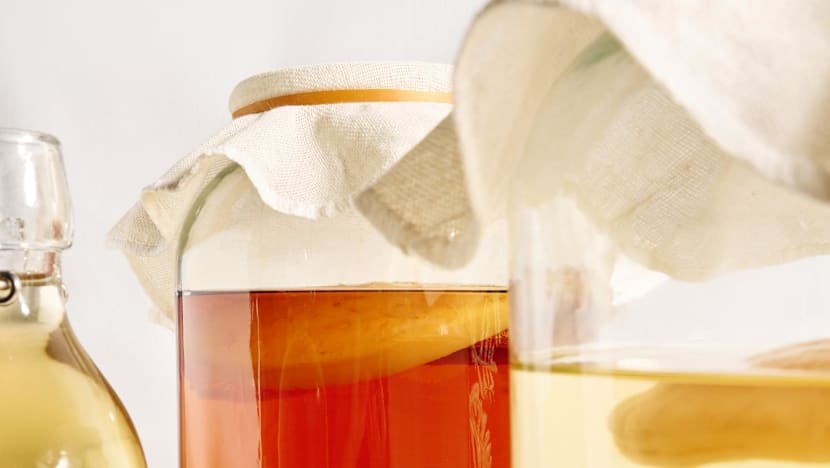Health
Kombucha’s Health Claims: Experts Weigh In on Benefits and Risks

The popularity of kombucha has surged, with many enthusiasts claiming a range of health benefits. However, experts caution that while some potential advantages exist, scientific evidence remains limited. Gabriela Fraiz, a doctoral student at the Federal University of Vicosa in Brazil, reported improvements in her gut health since she began drinking kombucha with her lunch. She noted a reduction in bloating and gas, alongside a preference for its “fizzy, slightly citrusy and sweet” taste. On social media, claims abound that kombucha can aid weight loss, help manage Type 2 diabetes, and lower the risk of heart disease and cancer.
Despite these assertions, Fraiz emphasized that most of the health benefits touted online lack substantial research support. Her studies into kombucha during her PhD work have highlighted the necessity for more rigorous scientific inquiry into the drink’s effects.
Understanding Kombucha’s Composition
Kombucha is a fermented beverage created from tea, sugar, and a symbiotic culture of bacteria and yeast, commonly referred to as a SCOBY. The fermentation process involves yeast converting sugar into alcohol and carbon dioxide, leading to its characteristic fizziness. Subsequently, bacteria convert much of the alcohol into acids, imparting a vinegary flavor.
The drink contains caffeine, beneficial plant compounds known as polyphenols, and typically less than 0.5 percent alcohol, which classifies it as non-alcoholic in commercial versions. While kombucha is generally low in sugar, some producers add extra sweeteners or fruit juices. Heather Hallen-Adams, an associate professor at the University of Nebraska-Lincoln, noted that homemade kombucha can be flavored with various fruits, herbs, or spices, while some commercial products are pasteurized to enhance shelf stability.
Health Benefits: What the Research Shows
Animal studies have suggested that kombucha may provide several health benefits, including reduced inflammation and improved blood sugar control. However, human clinical trials are limited and often yield inconsistent results. A 2024 randomized controlled trial involving approximately 60 participants with excess body weight revealed that those consuming about seven ounces of kombucha daily for ten weeks did not experience significant weight loss compared to the control group. Although the kombucha drinkers reported less acid reflux and bloating, their gut microbiome showed no notable changes.
Another small trial from the same year, involving 16 participants who consumed two cups of kombucha daily for four weeks, found no significant impact on blood pressure, cholesterol, or inflammation levels when compared to a control group of eight participants.
Conversely, some studies have presented more promising outcomes. In a 2023 study, 11 healthy adults consumed a meal paired with different drinks, including kombucha. The results indicated a 20 percent reduction in blood sugar responses after meals when kombucha was consumed. Furthermore, a separate trial from the same year reported that drinking one cup of kombucha daily for four weeks significantly lowered fasting blood sugar levels in individuals with Type 2 diabetes, although this study included only 12 participants, making the findings preliminary.
Experts, including Dr. Dan Merenstein from Georgetown University, have urged caution regarding the interpretation of these results. He noted the absence of high-quality research to definitively confirm the health benefits of kombucha. Justin Sonnenburg, a professor at Stanford University, stated that while limited studies suggest a diet rich in fermented foods—including kombucha—could correlate with a healthier microbiome and reduced inflammation, further investigation is necessary.
Expert Recommendations and Precautions
Experts advise moderation and caution when it comes to kombucha consumption. Dr. Sonnenburg highlighted that opting for a low-sugar version is unlikely to be harmful and could serve as a healthier alternative to sugary sodas or cocktails. When purchasing kombucha, consumers are encouraged to select products with a brief ingredient list, primarily consisting of tea, sugar, and possibly fruit juices, herbs, or spices. It is advisable to avoid brands with high levels of added sugars, as some contain over 10 grams per serving.
For those interested in brewing their own kombucha, Dr. Hallen-Adams suggested procuring a SCOBY from a reputable source. Homemade batches are vulnerable to contamination, and maintaining a clean brewing environment is crucial. If mold appears, it is essential to discard both the batch and the SCOBY. Dr. Merenstein cautioned that individuals with compromised immune systems should prefer store-bought kombucha, as there have been rare instances of severe illness linked to homemade versions, including liver injuries and acidosis.
As the conversation around kombucha continues, it is essential to balance enthusiasm for this trendy beverage with a critical understanding of the current scientific landscape surrounding its health claims.
-

 World5 months ago
World5 months agoSouth Korea’s Foreign Minister Cho Hyun to Visit China This Week
-

 Business5 months ago
Business5 months agoStarling Bank Plans Secondary Share Sale, Targeting $5.4 Billion Valuation
-

 Top Stories5 months ago
Top Stories5 months agoMunsang College Celebrates 100 Years with Grand Ceremony
-

 World5 months ago
World5 months agoPAS Aims to Expand Parliamentary Influence in Upcoming Election
-

 Business7 months ago
Business7 months agoKenvue Dismisses CEO Thibaut Mongon as Strategic Review Advances
-

 Lifestyle6 months ago
Lifestyle6 months agoHumanism Camp Engages 250 Youths in Summer Fest 2025
-

 Sports6 months ago
Sports6 months agoDe Minaur Triumphs at Washington Open After Thrilling Comeback
-

 Sports7 months ago
Sports7 months agoTupou and Daugunu Join First Nations Squad for Lions Clash
-

 Top Stories7 months ago
Top Stories7 months agoColombian Senator Miguel Uribe Shows Signs of Recovery After Attack
-

 World7 months ago
World7 months agoASEAN Gears Up for Historic Joint Meeting of Foreign and Economic Ministers
-

 Health6 months ago
Health6 months agoNew Study Challenges Assumptions About Aging and Inflammation
-

 Business7 months ago
Business7 months agoOil Prices Surge Following New EU Sanctions on Russia









